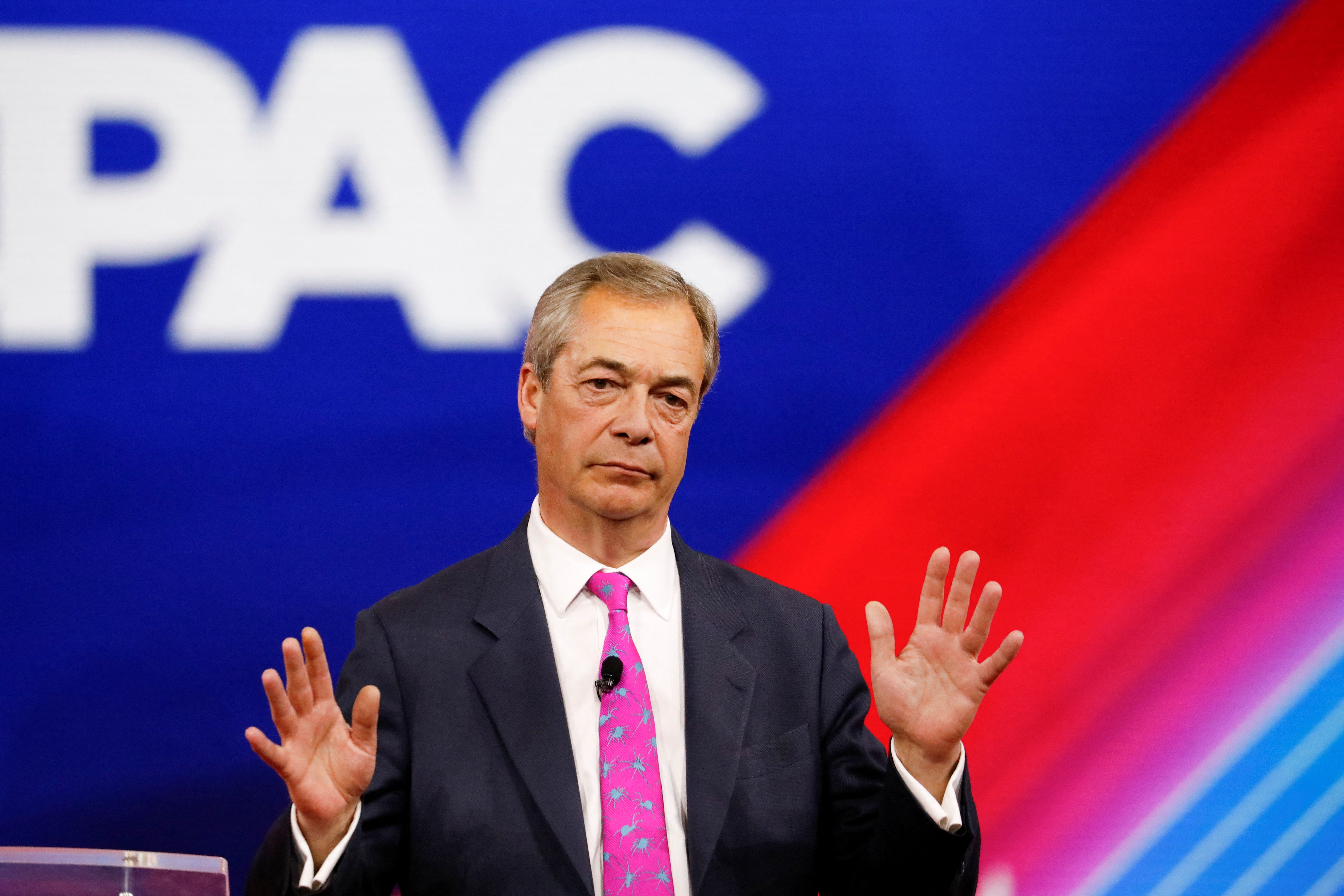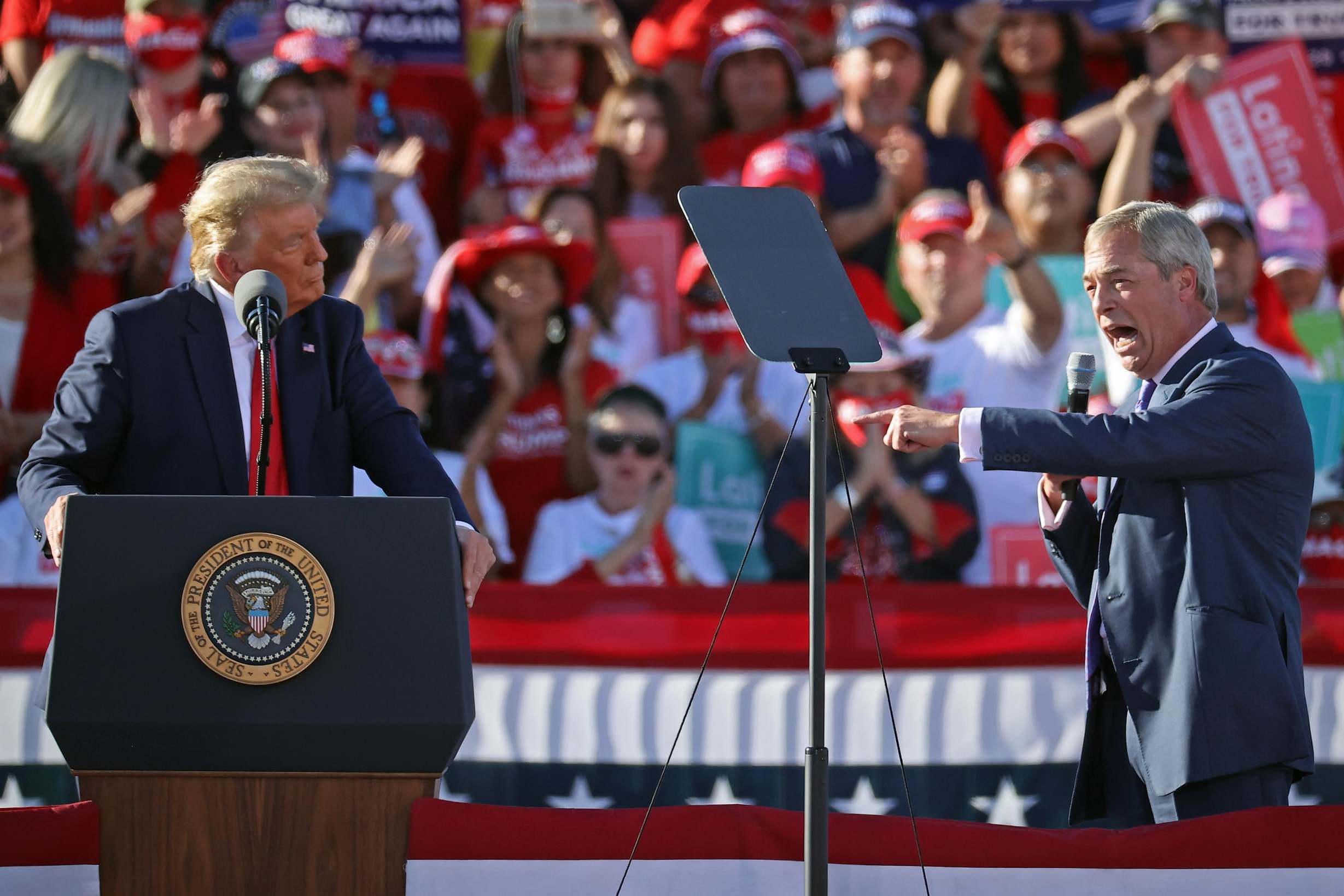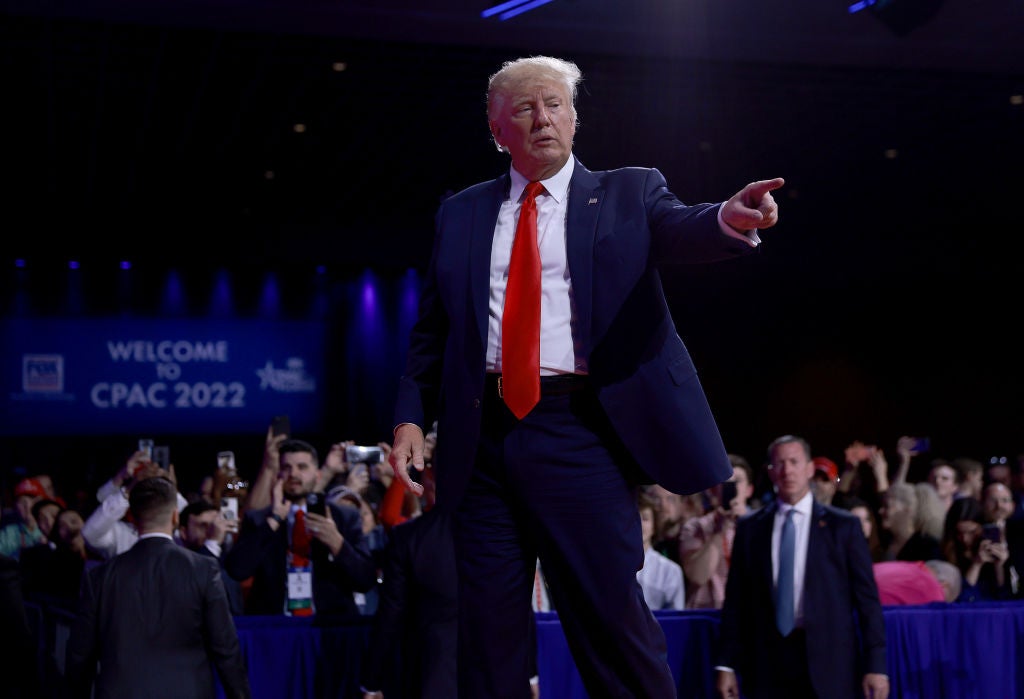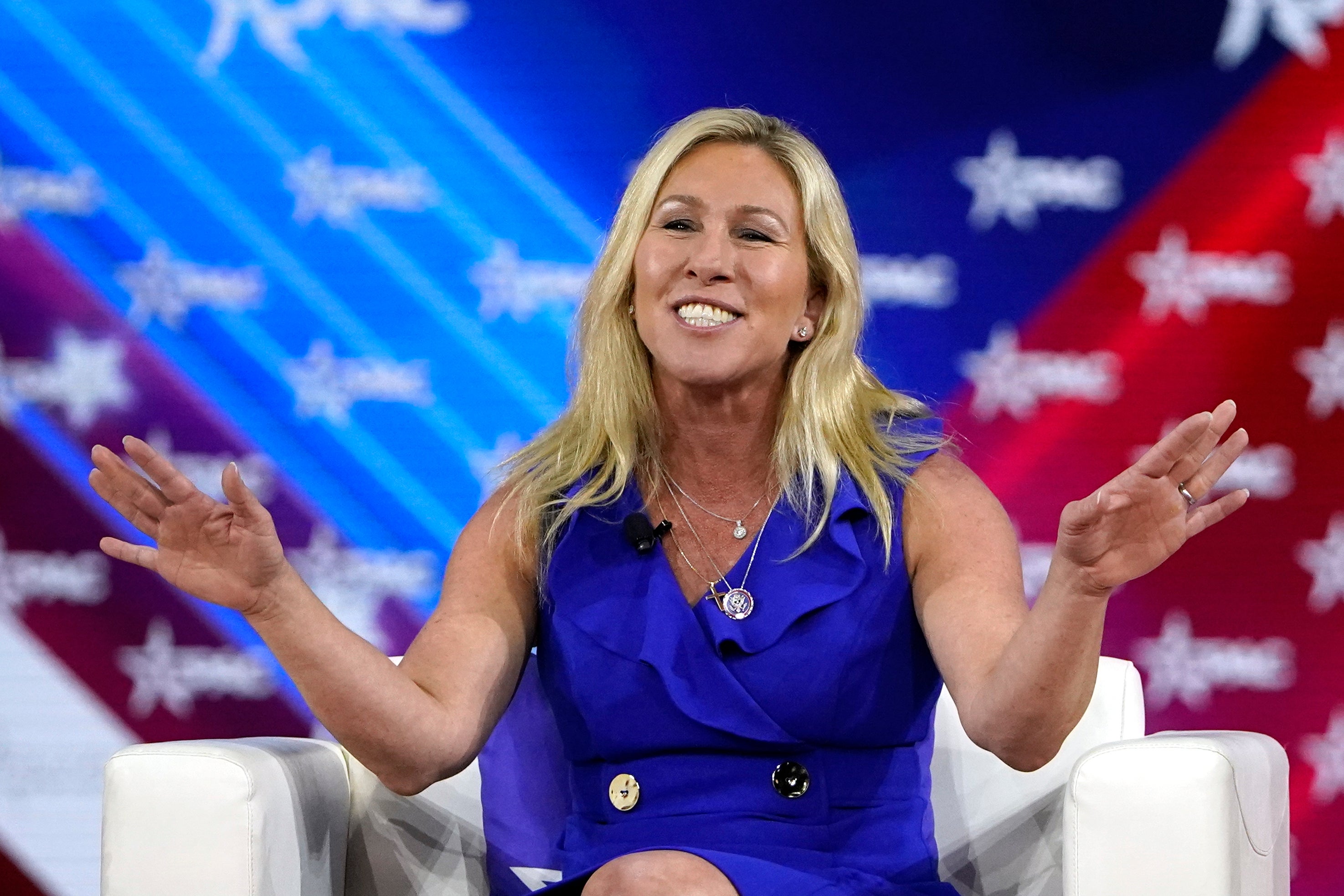Nigel Farage’s American life: Between statesman and culture warrior
At the Conservative Political Action Conference in Orlando, Florida, Richard Hall speaks to the former UKIP leader

Your support helps us to tell the story
From reproductive rights to climate change to Big Tech, The Independent is on the ground when the story is developing. Whether it's investigating the financials of Elon Musk's pro-Trump PAC or producing our latest documentary, 'The A Word', which shines a light on the American women fighting for reproductive rights, we know how important it is to parse out the facts from the messaging.
At such a critical moment in US history, we need reporters on the ground. Your donation allows us to keep sending journalists to speak to both sides of the story.
The Independent is trusted by Americans across the entire political spectrum. And unlike many other quality news outlets, we choose not to lock Americans out of our reporting and analysis with paywalls. We believe quality journalism should be available to everyone, paid for by those who can afford it.
Your support makes all the difference.Nigel Farage is striding across the lobby of a glitzy hotel in Orlando when he is interrupted, not once but three times, by admirers. The hotel is hosting the annual Conservative Political Action Conference (CPAC), a gathering of extremely online activists from across the US, at which Farage is a star speaker.
The former UKIP leader, Brexit champion, and now television presenter on a small right-wing news channel, has ceased to be a mainstay of British politics. He no longer enjoys a constant presence on the pages of British newspapers. It was, ironically, his lifelong ambition and crowning achievement – Britain’s exit from the European Union – that robbed him of that attention.
Here in Florida, however, among Donald Trump supporters, fighters of imaginary communist hordes, and opponents of the teaching of black history, his popularity has not waned. He is a regular feature at CPAC, and this year he steps onto the stage in the footsteps of former secretary of state Mike Pompeo, Ben Carson, and former US intelligence chief Richard Grenell.
I wanted to find out what lies behind his lasting popularity with the American right. What does he see in them, and them in him?
I’m reminded of one of the lesser storylines from the romantic comedy Love Actually, in which a young man who can’t get laid in the UK decides to move to America, where, he says, the “girls would seriously dig me with my cute British accent”. Is Farage attempting the political equivalent of that journey?
When I ask some of the CPAC attendees about “Mr Brexit”, as he is known on these shores, their answers range from a vague fondness for his sense of humour to lengthy comparisons between his battle with the European Union and the struggle between states’ rights and the federal government in the US.
“I’ve seen the really funny videos where he takes the piss out of the [European] parliament,” says Diana Castillo, a Palm Beach resident. “He stands up against the majority. His sense of humour is amazing.”
“He stands for the same things we stand for,” she adds.
“I think he recognises how the European Union took from England the opportunity to be independent,” John Brunner, another attendee, tells me. “Because of our understanding of states’ autonomy and states’ rights, and having the ability to make those decisions locally, I think that’s where we recognise the fallacy of the EU. I think Nigel was very right in pushing for that.”
I meet Farage in a quiet part of the hotel lobby a few hours before he is due on stage. When I ask him for his thoughts on the source of his popularity, he has a rather simple answer.
“All of this because of YouTube. None of it would’ve happened, in that I’d have probably walked away from politics in 2010. But suddenly YouTube came along,” he says.

It was his speeches to the European parliament, where he chastised the elected body in grandstanding monologues designed to undermine it, that made him famous. Those videos frequently went viral among right-wing conservatives in the US, and caught the attention of some powerful Republican figures.
His first introduction to US politics came from Jeff Sessions, then a Republican senator from Alabama, who would go on to become Trump’s attorney general. Sessions saw him on YouTube and invited him to Washington DC to speak to a group of senators in 2010.
A few years later, in 2014, another admirer would get in touch. Donald Trump had not yet decided to run for president, but he saw a kindred spirit in Farage.
“Again, he’d seen my speeches in the parliament. He’d seen that I was, you know, causing a bit of a stir, and I’m told that he sat for hours watching stuff,” says Farage.
It was his association with Trump that would catapult him to stardom here in the US. He was a regular at rallies: Trump once introduced Farage at a rally as “one of the most powerful men in Europe”.
Trump also drew comparisons between Brexit and his own campaign.
“You see it all over Europe and many other cases where they want to take their borders back. They want to take their monetary [sic] back. They want to take a lot of things back. They want to have a country again. I think you are going to have this more and more. I really believe that. And it is happening in the United States,” he said on a visit to Scotland just after the Brexit result came in.

The two also shared the same strategy for garnering media attention, Farage says. “I think the idea that you’d say something that would cause outrage, and rather than apologise for it, you’d double down and go further. Which is what I always did,” he says. “That was very deliberate.”
Farage is in the news again the day we meet because of a years-old outrage. It is just days after Vladimir Putin ordered a Russian invasion of neighbouring Ukraine in an attempt to topple the country’s democratically elected government. There is a reckoning in the media for Putin’s admirers, and comments made by Farage in a 2014 interview, in which he was asked which world leader he most admired, have resurfaced.
“As an operator, but not as a human being, I would say Putin,” he replied at the time. “The way he played the whole Syria thing. Brilliant. Not that I approve of him politically. How many journalists in jail now?”
I ask him if he regrets those comments now, in light of recent events. Farage says his comments were taken out of context.
“I said he was a bad guy. I wouldn’t want to live in Russia. I thought the way that people disappear... I said all of those things. But as a world leader, as a player of chess, in 2014, I did admire him more than the others in terms of his ability. I have to say, in the last 72 hours I’ve slightly revised that. I do wonder now, with what he’s doing, whether he still has rational function.
“I didn’t think he’d do what he’s done,” he adds.
While his opinion on Putin has shifted, his relationship with Trump has not. But Trump is an entirely different person from the man Farage first met as a candidate. In the final days of his presidency, Trump launched an enormous effort to overturn the results of the presidential election by spreading lies about the integrity of the vote. Those lies ultimately led to a violent attack by his supporters on the US Capitol during certification of the election. He has spent all of his time out of office continuing to push those same lies and undermine the next presidential election. Is this not an attack on democracy?
“This is another area where I do feel very strongly,” Farage says. He recounts an appearance on Steve Bannon’s podcast where he predicted Trump would “win on the day. And by day three, he will have lost.”
I ask him what he meant by that.
“Postal votes,” he says. “It was obvious what was going to happen. Just as I’ve seen the utter corruption of voting in Britain’s cities, it’s completely corrupted.”

But there has been no evidence of widespread fraud in the US election, I counter, despite dozens of investigations and probes. He responds with a lengthy attack on the concept of postal voting.
“America of course had no history of this. So exactly what went on, who’s to say. And actually, probably the truth is that what happened wasn’t illegal, because there weren’t any rules in place,” he says.
I get the sense that he doesn’t believe the claims by Trump that the election was stolen, but is unwilling to unequivocally say so for fear of harming that relationship. It’s the kind of feint that he has become known for. But it is much harder to talk away a friendship with Steve Bannon, a former Trump ally who is being investigated for his role in the Capitol attack, and who regularly uses violent language on his podcast. How does a Brit who claims to believe in democracy justify a relationship with an extremist?
“I think there are some areas in which he is beyond the pale for a lot of British people. It’s politics and argument expressed as warfare,” he says.
“It’s all trench stuff. And then you see his Oxford Union speech and you think, wow, educated, knowledgeable, erudite. It’s really weird; Steve likes to be the baddie. He wants to be thought of as the villain stroking the white cat in the James Bond film.”
But that kind of speech has real-world effects, I argue. It encourages violence, and the 6 January attack was a perfect example of that.
“Just think about what Democrats have said about Black Lives Matter,” responds Farage. “People burning down centres of cities, and you had Democrats condoning it. Across the board there’s been real weakness on this, and I could never be accused of that.”
In the US, Farage seems to be constantly surrounded by people with views more extreme than his own, and admired by people who believe in dark conspiracies and encourage violence, which he claims to abhor. He will distance himself just enough so as not to appear crazy, but not enough that they stop returning his calls.
There are other times, though, where he appears to be fully signed up to American culture wars that have little basis in reality. He talks about “the enemy within” here in the US, echoing overblown language about the “horrible virus of Marxism, which is back intent on destroying our identities, our histories, poisoning the minds of our kids through education”.
Sometimes he appears to be torn between these two personalities. Does he really believe the US is poisoned by Marxism, I ask? Is Biden a Marxist?
“Some of that stuff’s silly,” he concedes. “I’m talking about the attempt to rubbish the founding fathers and the work they did by comparing our values of today with their values of then. The removal of statues. That is a form of Marxism. It’s a form of wanting to bring down the whole thing. So there’s an enemy without, there’s an enemy within, and these are real civilisational battles for the west.”
When he strays on to those topics, the veneer of polite British gentleman disappears and he begins to blend in a bit more here at CPAC, an event where the loudest cheers follow dire warnings that the communists are at the door and coming to take away people’s guns/kids/pensions.

It’s the kind of mixed-bag ideology that has become increasingly common with the rise of alt-right online media and the rejection of mainstream news. It’s a bubble within which everything is a culture war, and fear drives engagement. Farage is as much a part of it here as he was back home, where he fuelled anti-migrant and anti-refugee sentiment with outlandish propaganda and lies to help his campaign for Britain to leave the EU.
The same online agitprop that propelled Trump to power also gave prominence to Farage in the US. That ecosystem took hold here in a way it hasn’t yet done in the UK.
But there’s no denying that his position among American conservatives is unique. What other British politician could command a crowd at CPAC? And how exactly does he use that influence?
He says his speech to CPAC today is going to be different.
“Normally I would be jokey, funny, try and get the crowd cheering and booing. That’s what I normally do at CPAC. Not today. I’m actually going to be very serious today.”
A few hours later I watch Farage stride out to rapturous applause on the CPAC stage. What follows is a familiar blend of culture-war nonsense and an attempt at rationality. After days of speakers focused entirely on bashing the woke mob, his speech actually stands out. He takes on two topics that no Republican who relies on conservative activists to get them elected would dare to touch: he praises Nato, and urges the crowd to move on from the 2020 election.
“Does it make sense for the Republican Party to go on talking about the stolen election?” Farage asks the crowd, who have heard days of speeches urging them not to move on from the election.
He then takes a shot across the bow of the isolationist America First mass before him, to ask that the US become a leader in the world again, and that it recommit to Nato in order to halt Putin and China.
“This remarkable alliance that has worked since the late 1940s, when it was put there to guarantee peace, has pretty much done a very good job over those years,” he says of Nato.
“So there needs to be a big public debate in America right now about ... if you wish to continue leading Nato. And if you do, that message must be sent loud and clear to Vladimir Putin. Because you know, if it’s not, if that message isn’t sent, I think Putin may well continue. I’ve come to that conclusion over the last few days,” he adds.
And then the mask drops again.
“They’re the enemies that we face, but we also face enemies inside. Our universities have been turned into madrasas of Marxism, determined to indoctrinate and poison our young people. Determined to turn the population against ourselves. While these great threats, these great global threats that I’m talking about, are happening, we’re still busy teaching people to feel guilty about being white,” he says to cheers.
In this attempt to be both a statesman and a culture warrior, he gets lost. But perhaps that’s how he sees himself: somewhere between Winston Churchill and Marjorie Taylor Greene.



Join our commenting forum
Join thought-provoking conversations, follow other Independent readers and see their replies
Comments